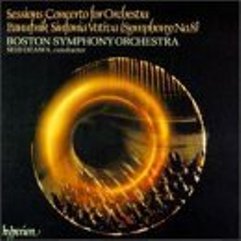Andrzej Panufnik - Sinfonia Votiva (1993)
Andrzej Panufnik - Sinfonia Votiva (1993)

1 Movement 1: Andante rubato, con devozione [13'57] 2 Movement 2: Allegro assai, con passione [8'05] Boston Symphony Orchestra Seiji Ozawa (conductor)
A complex work inspired by a combination of cultural vectors, Panufnik's eighth symphony is after all geometrically constructed, in his own words, ".. by fitting it into a circle, and I chose the number 8 (this being my eighth symphony) as a guiding principle for its internal geometry." Written in 1980 and 1981 during the revolt of Polish shipyard workers in Gdansk, it is a spiritual and patriotic offering - a votive to the miraculous icon of the Black Madonna of Czestochowa, the composer's home town. He describes the work nonetheless as an abstract work.
While this may elude the listener, the work plays out in two movements, the first of which, a fourteen minute Andante rubato con devozione, begins with plaintive woodwind solos which accept the support of a stepping vibraphone. As the principals of the string sections contribute, the work takes on a sort of contemplative, eerie glow. The pattern is repeated with the various brass instruments, followed by sections of the orchestra entering as groups. The movement closes softly with a serene passage by eleven solo string players.
The second movement, an eight minute Allegro assai con passione, is more brisk and aggressive in nature and is described by the composer as "an earnest petition". It begins with a jagged, brittle riff in the brass and high percussion and allows a singing string theme to enter and pass through. The movement builds through discordant fanfares and sawing arcs to a series of zagging, intense outbursts from all choirs of the large orchestra. The ending is highly dramatic and features strident brass and percussion.
Significant as a nationalistic yet abstract symphonic work geometrically constructed, the piece contains discernible themes and rhythms and does in fact have the effect of inspiring and disturbing the attentive listener. For its severity, it is, in a word, musical. ---Michael Morrison, Rovi
Mimo, iż SINFONIA VOTIVA Panufnika dedykowana jest Bostońskiej Orkiestrze, na jej powstanie miały też wpływ wydarzenia w Polsce z początku lat osiemdziesiątych. Kompozytor, głęboko przejęty dramatycznymi wieściami z ojczystego kraju, postanowił, że utwór będzie rodzajem jego dziękczynnej (vel wotywnej - stąd tytuł kompozycji) ofiary dla Czarnej Madonny z Jasnej Góry. Na rok 1982 zaplanowano bowiem uroczyste obchody 600 lat pobytu cudownego obrazu w polskim klasztorze. Pierwsza z dwóch części SINFONII przybrała ostatecznie kształt modlitwy z cytatami z BOGURODZICY i nawiązaniami do brzmienia chorału gregoriańskiego. Druga, zdecydowanie odmienna w charakterze od poprzedniej -gwałtowna, dynamiczna, pełna dysonansów, wyraża protest Panufnika przeciwko wydarzeniom, mającym miejsce w Polsce. Cały utwór zaświadcza głęboki związek emocjonalny kompozytora, na stałe przebywającego w Anglii, ze swoją opuszczoną ojczyzną. --- culture.pl
download: uploaded yandex 4shared mediafire solidfiles mega gett filecloudio nornar ziddu
Last Updated (Saturday, 08 March 2014 20:40)








